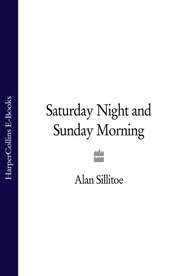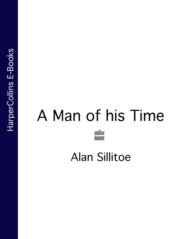По всем вопросам обращайтесь на: info@litportal.ru
(©) 2003-2024.
✖
The Loneliness of the Long Distance Runner
Автор
Год написания книги
2018
Настройки чтения
Размер шрифта
Высота строк
Поля
Told to go, I trotted down the pavilion steps, out on to the field because the big cross-country was about to begin and the two entries from Gunthorpe had fixed themselves early at the starting line and were ready to move off like white kangaroos. The sports ground looked a treat: with big tea-tents all round and flags flying and seats for families – empty because no mam or dad had known what opening day meant – and boys still running heats for the hundred yards, and lords and ladies walking from stall to stall, and the Borstal Boys Brass Band in blue uniforms; and up on the stands the brown jackets of Hucknall as well as our own grey blazers, and then the Gunthorpe lot with shirt sleeves rolled. The blue sky was full of sunshine and it couldn’t have been a better day, and all of the big show was like something out of Ivanhoe that we’d seen on the pictures a few days before.
‘Come on, Smith,’ Roach the sports master called to me, ‘we don’t want you to be late for the big race, eh? Although I dare say you’d catch them up if you were.’ The others catcalled and grunted at this, but I took no notice and placed myself between Gunthorpe and one of the Aylesham trusties, dropped on my knees and plucked a few grass blades to suck on the way round. So the big race it was, for them, watching from the grandstand under a fluttering Union Jack, a race for the governor, that he had been waiting for, and I hoped he and all the rest of his pop-eyed gang were busy placing big bets on me, hundred to one to win, all the money they had in their pockets, all the wages they were going to get for the next five years, and the more they placed the happier I’d be. Because here was a dead cert going to die on the big name they’d built for him, going to go down dying with laughter whether it choked him or not. My knees felt the cool soil pressing into them, and out of my eye’s corner I saw Roach lift his hand. The Gunthorpe boy twitched before the signal was given; somebody cheered too soon; Medway bent forward; then the gun went, and I was away.
We went once around the field and then along a half-mile drive of elms, being cheered all the way, and I seemed to feel I was in the lead as we went out by the gate and into the lane, though I wasn’t interested enough to find out. The five-mile course was marked by splashes of whitewash gleaming on gateposts and trunks and stiles and stones, and a boy with a waterbottle and bandage-box stood every half-mile waiting for those that dropped out or fainted. Over the first stile, without trying, I was still nearly in the lead but one; and if any of you want tips about running, never be in a hurry, and never let any of the other runners know you are in a hurry even if you are. You can always overtake on long-distance running without letting the others smell the hurry in you; and when you’ve used your craft like this to reach the two or three up front then you can do a big dash later that puts everybody else’s hurry in the shade because you’ve not had to make haste up till then, I ran to a steady jog-trot rhythm, and soon it was so smooth that I forgot I was running, and I was hardly able to know that my legs were lifting and falling and my arms going in and out, and my lungs didn’t seem to be working at all, and my heart stopped that wicked thumping I always get at the beginning of a run. Because you see I never race at all; I just run, and somehow I know that if I forget I’m racing and only jog-trot along until I don’t know I’m running I always win the race. For when my eyes recognize that I’m getting near the end of the course – by seeing a stile or cottage corner – I put on a spurt, and such a fast big spurt it is because I feel that up till then I haven’t been running and that I’ve used up no energy at all. And I’ve been able to do this because I’ve been thinking; and I wonder if I’m the only one in the running business with this system of forgetting that I’m running because I’m too busy thinking; and I wonder if any of the other lads are on to the same lark, though I know for a fact that they aren’t. Off like the wind along the cobbled footpath and rutted lane, smother than the flat grass track on the field and better for thinking because it’s not too smooth, and I was in my element that afternoon knowing that nobody could beat me at running but intending to beat myself before the day was over. For when the governor talked to me of being honest when I first came in he didn’t know what the word meant or he wouldn’t have had me here in this race, trotting along in shimmy and shorts and sunshine. He’d have had me where I’d have had him if I’d been in his place: in a quarry breaking rocks until he broke his back. At least old Hitler-face the plain-clothes dick was honester than the governor, because he at any rate had had it in for me and I for him, and when my case was coming up in court a copper knocked at our front door at four o’clock in the morning and got my mother out of bed when she was paralytic tired, reminding her she had to be in court at dead on half past nine. It was the finest bit of spite I’ve ever heard of, but I would call it honest, the same as my mam’s words were honest when she really told that copper what she thought of him and called him all the dirty names she’d ever heard of, which took her half an hour and woke the terrace up.
I trotted on along the edge of a field bordered by the sunken lane, smelling green grass and honeysuckle, and I felt as though I came from a long line of whippets trained to run on two legs, only I couldn’t see a toy rabbit in front and there wasn’t a collier’s cosh behind to make me keep up the pace. I passed the Gunthorpe runner whose shimmy was already black with sweat and I could just see the corner of the fenced-up copse in front where the only man I had to pass to win the race was going all out to gain the half-way mark. Then he turned into a tongue of trees and bushes where I couldn’t see him anymore, and I couldn’t see anybody, and I knew what the loneliness of the long-distance runner running across country felt like, realizing that as far as I was concerned this feeling was the only honesty and realness there was in the world and I knowing it would be no different ever, no matter what I felt at odd times, and no matter what anybody else tried to tell me. The runner behind me must have been a long way off because it was so quiet, and there was even less noise and movement than there had been at five o’clock of a frosty winter morning. It was hard to understand, and all I knew was that you had to run, run, run, without knowing why you were running, but on you went through fields you didn’t understand and into woods that made you afraid, over hills without knowing you’d been up and down, and shooting across streams that would have cut the heart out of you had you fallen into them. And the winning post was no end to it, even though crowds might be cheering you in, because on you had to go before you got your breath back, and the only time you stopped really was when you tripped over a tree trunk and broke your neck or fell into a disused well and stayed dead in the darkness forever. So I thought: they aren’t going to get me on this racing lark, this running and trying to win, this jog-trotting for a bit of blue ribbon, because it’s not the way to go on at all, though they swear blind that it is. You should think about nobody and go your own way, not on a course marked out for you by people holding mugs of water and bottles of iodine in case you fall and cut yourself so that they can pick you up – even if you want to stay where you are – and get you moving again.
On I went, out of the wood, passing the man leading without knowing I was going to do so. Flip-flap, flip-flap, jog-trot, jog-trot, crunchslap-crunchslap, across the middle of a broad field again, rhythmically running in my greyhound effortless fashion, knowing I had won the race though it wasn’t half over, won it if I wanted it, could go on for ten or fifteen or twenty miles if I had to and drop dead at the finish of it, which would be the same, in the end, as living an honest life like the governor wanted me to. It amounted to: win the race and be honest, and on trot-trotting I went, having the time of my life, loving my progress because it did me good and set me thinking which by now I liked to do, but not caring at all when I remembered that I had to win this race as well as run it. One of the two, I had to win the race or run it, and I knew I could do both because my legs had carried me well in front – now coming to the short cut down the bramble bank and over the sunken road – and would carry me further because they seemed made of electric cable and easily alive to keep on slapping at those ruts and roots, but I’m not going to win because the only way I’d see I came in first would be if winning meant that I was going to escape the coppers after doing the biggest bank job of my life, but winning means the exact opposite, no matter how they try to kill or kid me, means running right into their white-gloved wall-barred hands and grinning mugs and staying there for the rest of my natural long life of stone-breaking anyway, but stone-breaking in the way I want to do it and not in the way they tell me.
Another honest thought that comes is that I could swing left at the next hedge of the field, and under its cover beat my slow retreat away fom the sports ground winning post. I could do three or six or a dozen miles across the turf like this and cut a few main roads behind me so’s they’d never know which one I’d taken; and maybe on the last one when it got dark I could thumb a lorry-lift and get a free ride north with somebody who might not give me away. But no, I said I wasn’t daft didn’t I? I won’t pull out with only six months left, and besides there’s nothing I want to dodge and run away from; I only want a bit of my own back on the In-laws and Potbellies by letting them sit up there on their big posh seats and watch me lose this race, though as sure as God made me I know that when I do lose I’ll get the dirtiest crap and kitchen jobs in the months to go before my time is up. I won’t be worth a threpp’ny-bit to anybody here, which will be all the thanks I get for being honest in the only way I know. For when the governor told me to be honest it was meant to be in his way not mine, and if I kept on being honest in the way he wanted and won my race for him he’d see I got the cushiest six months still left to run; but in my own way, well, it’s not allowed, and if I find a way of doing it such as I’ve got now then I’ll get what-for in every mean trick he can set his mind to. And if you look at it in my own way, who can blame him? For this is war – and ain’t I said so? – and when I hit him in the only place he knows he’ll be sure to get his own back on me for not collaring that cup when his heart’s been set for ages on seeing himself standing up at the end of the afternoon to clap me on the back as I take the cup from Lord Earwig or some such chinless wonder with a name like that. And so I’ll hit him where it hurts a lot, and he’ll do all he can to get his own back, tit for tat, though I’ll enjoy it most because I’m hitting first, and because I planned it longer. I don’t know why I think these thoughts are better than any I’ve ever had, but I do, and I don’t care why. I suppose it took me a long time to get going on all this because I’ve had no time and peace in all my bandit life, and now my thoughts are coming pat and the only trouble is I often can’t stop, even when my brain feels as if it’s got cramp, frostbite and creeping paralysis all rolled into one and I have to give it a rest by slap-dashing down through the brambles of the sunken lane. And all this is another uppercut I’m getting in first at people like the governor, to show how – if I can – his races are never won even though some bloke always comes unknowingly in first, how in the end the governor is going to be doomed while blokes like me will take the pickings of his roasted bones and dance like maniacs around his Borstal’s ruins. And so this story’s like the race and once again I won’t bring off a winner to suit the governor; no, I’m being honest like he told me to, without him knowing what he means, though I don’t suppose he’ll ever come in with a story of his own, even if he reads this one of mine and knows who I’m talking about.
Вы ознакомились с фрагментом книги.
Приобретайте полный текст книги у нашего партнера:
Приобретайте полный текст книги у нашего партнера:










